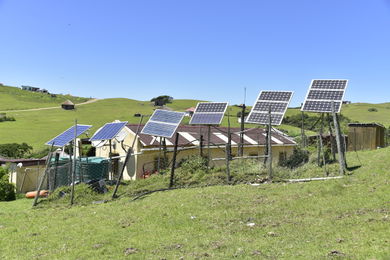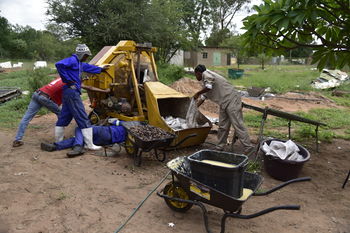Difference between revisions of "Powering Biotrade: Renewable energy and energy efficiency in the southern African biotrade and small agricultural sector"
***** (***** | *****) |
***** (***** | *****) |
||
| Line 4: | Line 4: | ||
Biotrade value chains are contributing to household food security, community employment, gender equality and poverty alleviation. Unfortunately, the value chain has not tapped its full potential yet. Energy constraints are a key reason for this sustainable business sector being still underdeveloped.<br/> | Biotrade value chains are contributing to household food security, community employment, gender equality and poverty alleviation. Unfortunately, the value chain has not tapped its full potential yet. Energy constraints are a key reason for this sustainable business sector being still underdeveloped.<br/> | ||
| + | |||
| Line 10: | Line 11: | ||
Inefficiencies in power consumption, Inaccessibility and high costs of grid power make a production of greater volumes and good quality biotrade products very difficult for farmers. If available, energy is often supplied by burning coal in distant power stations. Renewable energy technologies could cope the energy gap but are mostly absent in southern African biotrade.<br/> | Inefficiencies in power consumption, Inaccessibility and high costs of grid power make a production of greater volumes and good quality biotrade products very difficult for farmers. If available, energy is often supplied by burning coal in distant power stations. Renewable energy technologies could cope the energy gap but are mostly absent in southern African biotrade.<br/> | ||
| − | + | [[File:PV installation at Bulungula Incubator's Primary School Project Eastern Cape Phytotrade Africa Study (46).JPG|none|390px|alt=PV installation at Bulungula Incubator's Primary School Project Eastern Cape]] | |
| − | [[File:PV installation at Bulungula Incubator's Primary School Project Eastern Cape Phytotrade Africa Study (46).JPG|390px| | ||
| − | |||
Revision as of 13:34, 7 June 2018
The Problem
Biotrade value chains are contributing to household food security, community employment, gender equality and poverty alleviation. Unfortunately, the value chain has not tapped its full potential yet. Energy constraints are a key reason for this sustainable business sector being still underdeveloped.
The Role of Energy
Inefficiencies in power consumption, Inaccessibility and high costs of grid power make a production of greater volumes and good quality biotrade products very difficult for farmers. If available, energy is often supplied by burning coal in distant power stations. Renewable energy technologies could cope the energy gap but are mostly absent in southern African biotrade.
Aim of the Report
The present report has been edited to explore the potential of renewable energy solutions and energy efficiency measures in the southern African biotrade sector. It sets a baseline for the design and implementation of pilot projects and develops a knowledge base of constraints, challenges and opportunities. Appropriate energy technologies for wider dissemination to the sector are presented.
Case Studies
The study team analysed 21 biotrade businesses in southern Africa, producing and processing several value chain products, i.e. Marula, Devil’s Claw. Current energy practice, upcoming energy requirements and potentials for the adoption of renewable energy solutions were examined.
Results
The study shows that the southern African and international biotrade is modest in scale at the moment and consumes relatively low amounts of energy. However, biotrade business farmers consulted intend to grow. Greater product volumes as well as more processing and manufacturing facilities subsequently implicate a need for more energy. Renewable sources could have positive spin-offs. Solar-powered drying facility for instance could improve quality or produce by reducing the risk of mould and making them more attractive for export markets.
Outlook
Why did biotrade farmers make no use of renewable energies until today? Limited understanding of renewables’ potential, a lack of technical knowledge and high capital costs among others are causal for the delayed uptake of renewable energy technologies in the Southern African market. An energy transition in biotrade could however be fostered by producers’ keen interest in learning more about renewables and import markets’ growing demand for carbon, energy and water audited products.
Publication























